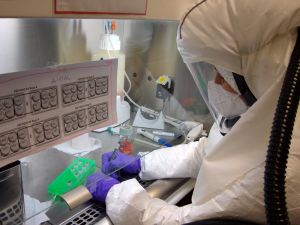Para desvelar el mecanismo de actuación de estos fármacos, los científicos han aplicado métodos de secuenciación masiva sobre los virus resultantes tras el tratamiento. Esteban Domingo, investigador del CSIC en el Centro de Biología Molecular Severo Ochoa (CBM-CSIC-UAM), destaca que así han identificado que “estos fármacos consiguen colapsar la replicación del virus al inducir un exceso de mutaciones en su genoma que afectan a la viabilidad viral”. Este mecanismo, denominado “mutagénesis letal”, es una estrategia antiviral de amplio espectro que ya se ha aplicado exitosamente con otros virus ARN altamente variables.
El trabajo es fruto de la colaboración de varios centros del CSIC, el Centro Nacional de Biotecnología, el Centro de Biología Molecular Severo Ochoa y el Instituto de Biología Molecular de Barcelona. En este último, el grupo de Nuria Verdaguer está desarrollando investigaciones acerca de la estructura y actividad de la maquinaría encargada de multiplicar el virus. Además, la estrecha colaboración con el IIS-FJD abre la posibilidad de trasladar a la clínica los hallazgos descritos en esta publicación.
Carlos García-Crespo, Ana Isabel de Ávila, Isabel Gallego, María Eugenia Soria, Antoni Duran-Pastor, Pilar Somovilla, Brenda Martínez-González, Javier Muñoz-Flores, Pablo Mínguez, Llanos Salar-Vidal, Mario Esteban-Muñoz, Elisabeth Cañar-Camacho, Cristina Ferrer-Orta, Sonia Zuñiga, Isabel Sola, Luis Enjuanes, Jaime Esteban, Ricardo Fernández-Roblas, Ignacio Gadea, Jordi Gómez, Nuria Verdaguer, Esteban Domingo and Celia Perales. Synergism between remdesivir and ribavirin leads to SARS‐CoV‐2 extinction in cell culture. British Journal of Pharmacology 2024. DOI: 10.1111/bph.16344
CNB-CSIC Comunicación / CSIC Comunicación






